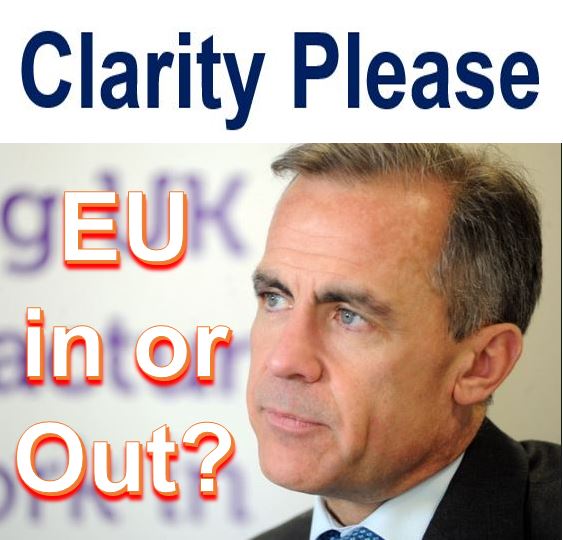The British Government urgently needs to provide clarity on its EU referendum procedure. The referendum will decide whether the United Kingdom stays or leaves the European Union (EU). While the vast majority of business leaders favour staying in, a growing number of Brits would like to leave.
In an interview during the BBC Radio 4 Today programme, Mr. Carney made it clear he believes Britain’s future should be within the EU. The country’s access to the EU’s common market was one of its major economic advantages, he stressed.
Mr. Carney said:
“It’s the largest economy in the world. It’s our largest investment destination. It’s the largest investor in the United Kingdom.”

The business community needs to know what the UK Government’s plans are regarding the EU referendum, says Mr. Carney.
Business need to know what’s going on
Businesses have not yet put off making investment decisions because of the UK’s uncertain stance regarding EU membership. However, the BoE’s chief said it is vital to be clear about the road ahead.
Mr. Carney said to interviewer John Humphrys:
“It’s in the interests of everybody that there is clarity about the process and the question and the decision…”
Mr. Carney refused to say what the timetable of the referendum should be, even though he was pressed on whether Prime Minister David Cameron should act sooner than his 2017 deadline.
Mr. Carney said:
“I wouldn’t put a specific timetable on it, the government has made it clear that it’s a priority, I’m sure the government will act with appropriate speed in developing the negotiations and putting forward an appropriate question.”
Cameron wants a good deal with EU
If a good deal can be reached which satisfies his demands for fundamental changes on the UK’s relationship with the trading bloc, a Cameron spokesperson said on Tuesday the Prime Minister should call the referendum earlier.
When Mr. Humphrys asked him whether ‘cheap foreign labour’ was stopping productivity increasing, Mr. Carney answered:
“I would really dampen down that explanation. In the course of the last two years the number of older workers, people in their 50s and their 60s who have stayed in the Labour market has been more than 300,000. More than we would have seen in previous times.”
“In addition people want to work more hours. That’s another 200,000 to 300,000 effectively more workers, compare that to the increase in net migration. The first two numbers total up to more than 500,000; the increase in net migration over that same period, the last two years is 50,000.”
Recording – BBC Radio 4 Today with Mark Carney

